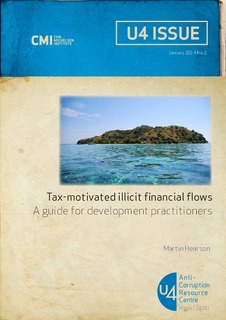| dc.contributor.author | Hearson, Martin | |
| dc.date.accessioned | 2018-01-04T08:18:22Z | |
| dc.date.available | 2018-01-04T08:18:22Z | |
| dc.date.issued | 2014-01-06 | |
| dc.identifier | oai:www.cmi.no:5017 | |
| dc.identifier.citation | Bergen: Chr. Michelsen Institute (U4 Issue 2014:2) 68 p. | |
| dc.identifier.uri | http://hdl.handle.net/11250/2474863 | |
| dc.description.abstract | Tax revenue can help governments finance development and decrease reliance on foreign aid. But tax-motivated illicit financial flows – tax evasion, tax avoidance and aggressive tax planning – undermine these efforts. Non-specialists may find that the complex discussion on taxation and IFFs is further complicated by the lack of clear definitions of relevant concepts, and by the often polarized nature of policy debates. This issue paper explains the terms and helps development practitioners and policy makers navigate the tax and illicit financial flow debates. It also gives an overview of donors’ interventions in this area. There is a growing recognition that tax-motivated illicit financial flows are facilitated in part by the policies of donor countries, hence policy coherence emerges as an important goal for the future. | |
| dc.language.iso | eng | |
| dc.publisher | Chr. Michelsen Institute | |
| dc.relation | U4 Issue | |
| dc.relation | 2014:2 | |
| dc.relation.ispartof | U4 Issue | |
| dc.relation.ispartofseries | U4 Issue 2014:2 | |
| dc.relation.uri | https://www.cmi.no/publications/5017-tax-motivated-illicit-financial-flows | |
| dc.subject | International Drivers of Corruption | |
| dc.title | Tax-motivated illicit financial flows: A guide for development practitioners | |
| dc.type | Research report | |
